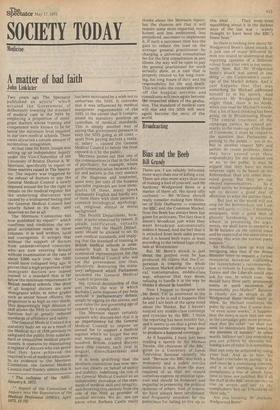Medicine
A matter of bad faith
John Linklater
Two years ago The Spectator published an article* which accused the Government of deliberately lowering the standard of medical care in the NHS by employing a proportion of immigrant doctors whose training and competence were known to be far below the minimum level required in our own medical schools. These views attracted a certain amount of incredulous antagonism. At that time Sir Keith Joseph was setting up an independent inquiry under the Vice-Chancellor of the University of Bristol, Doctor A. WMerrison, specifically to report on these matters raised in The Spectator. The inquiry was triggered by the refusal of doctors to pay the General Medical Council a newly imposed annual fee for the right to remain on the medical register. but the underlying discontent was caused by a widespread feeling that the General Medical Council had utterly failed in its duty, and deserved no fee at all.
The Merrison Committee has now published its report** which comfirms and vindicates the original accusations made in these columns. It is well written, lucid and courageous. It accepts that without the support of doctors from underdeveloped countries, who are now entering Britain without examination at the rate of about 3,000 each year, the NHS would have collapsed long ago. It proves that a high proportion of the immigrant doctors are indeed trained to a standard that is far below the minimum requirement in British medical schools. One third of all hospital doctors are now iMmigrants while, in some grades such as senior house officers, the proportion is as high as two thirds. This disquietingly high dilution of skill allows the NHS to continue to function but at greatly reduced standards of efficiency and safety.
The General Medical Council is a statutory body set up as a result of the Medical Act of 1858 precisely to safeguard the public from substandard or unqualified medical practitioners. It operates by maintaining a register of doctors who can prove that they have achieved the required level of medical education. In its evidence to the Morrison Committee, the General Medical Council itself frankly admits that it
has been motivated by a wish not to embarrass the NHS. It concedes that it was influenced by medical manpower requirements of the NHS, to the extent that it compromised its statutory position as custodian of medical standards. This is simply another way of saying that government pressure to keep the NHS going at all costs — apart from paying doctors a realistic salary — caused the General Medical Council to betray the trust reposed in it by the public. Merrison points out that one of the consequences is that in the field of psychiatry, for example, where good communication between doctor and patient is the very essence of the diagnosis and treatment, some sixty per cent of the hospital specialist registrars are now immigrants. Of these, many speak inadequate English and hardly any of them share with their patients a common sociological, mythological, religious, ethical or moral background.
The Health Department, however, is quite unmoved by reason. It pleads justification, virtually asserting that the Health Department should be allowed to set its own medical standards, and implying that the standard of training in British medical schools is unnecessarily high. It has therefore, nominated representatives for the General Medical Council who will toe the government line thus, effectively, destroying the statutory safeguard which Parliament intended the General Medical Council to provide. Sly, cynical dictatorship of this sort recalls the way in which Barbara Castle disposes of pay beds without a parliamentary debate, simply by egging on the unions, and over-rules the law governing age of consent by a simple edict. The Merrison report certainly explains why doctors feel that it is an impertinence for the General Medical Council to impose an annual fee to support a medical register which no longer has any real meaning, and why several hundred British trained doctors leave this country each year in disgust, disenchantment and despair. It is most gratifying that the Merrison committee has now spoken out clearly on behalf of sanity and stability, redefining the role of the General Medical Council as an independent custodian of the standards of medical skill and integrity, and divorcing this entirely from the role of the NHS as provider of medical services. We do not yet know what Barbara Castle really
thinks about the Merrison report, but the chances are that it will require some more impartial, more honest and less embittered, less prejudiced, successor to implement it. If such a successor then has the guts to reduce the load on the average general practitioner by charging a universal consultation fee for the first consultation in any illness, the way will be open to pay the general practitioner for work actually done, at a rate that is properly related to his long training, his long hours of duty and his responsibility for life and death. This will take the intolerable strain off the hospital services and consultants will once again become the respected elders of the profession. The standard of medical care will rise and the NHS will once again become the envy of the world.


























 Previous page
Previous page